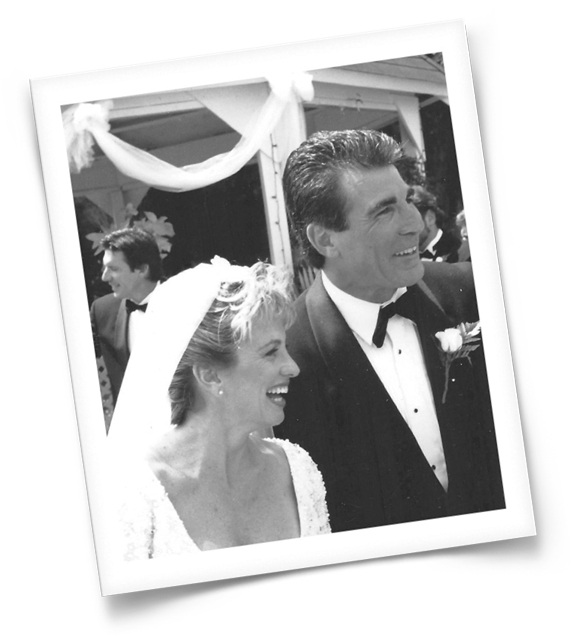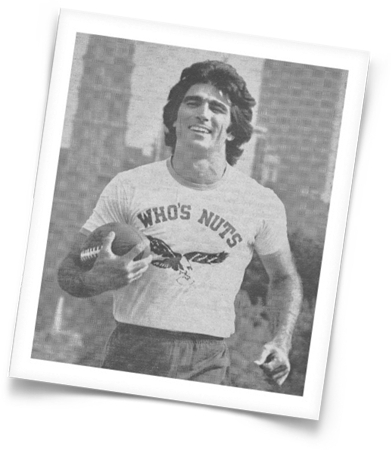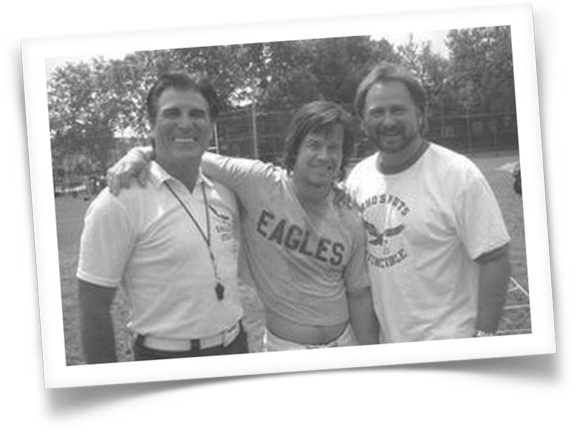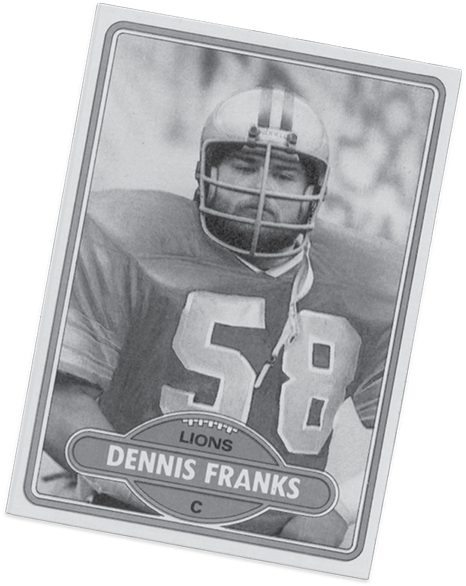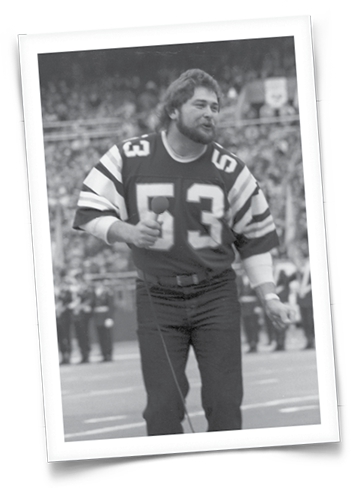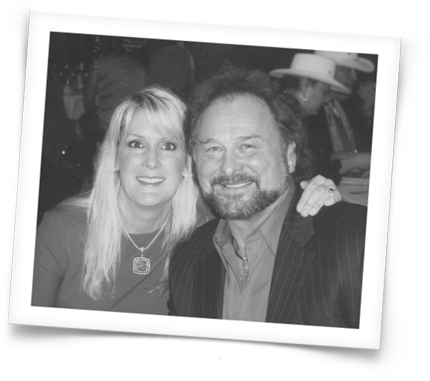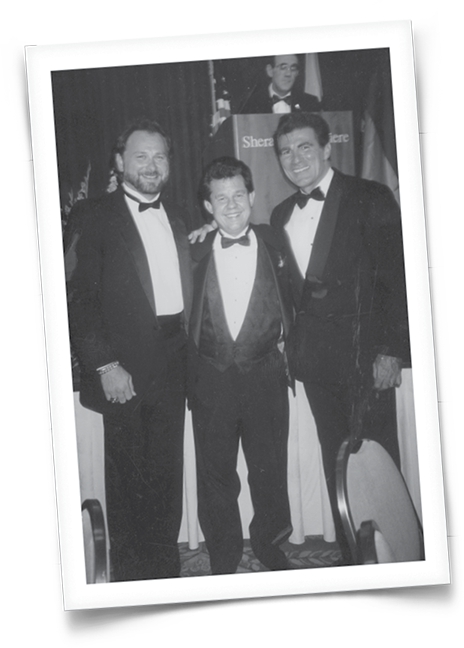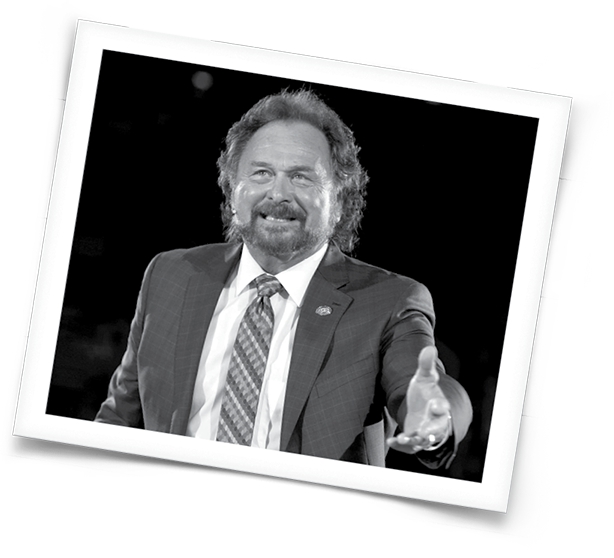SECTION II
THE REST OF THE STORY
W
hen we met, it was hate at first sight. We were floor control managers (A.K.A. bouncers) at a bar. It was a way to pick up some extra cash during the off season before fall tryouts. We were vying for a coveted position to play for the Philadelphia Eagles. Testy young men, wired for competition and confrontation, we did not like each other at all.
Then one night, a bar room brawl broke out. It was our job to break it up and bounce the instigators. Standing back to back, we did our job. We emerged from the battle, bloody, bruised, and brothers. Our friendship was forged. It’s been forty years and we have had each other’s back ever since.
As our friendship grew, we compared notes and learned we had a hell of a lot in common. We both grew up in Rust Belt, working-class neighborhoods. Our fathers were hard workers. Dennis’s father valued hard work by the hour and the sweat of the brow. He wasn’t crazy about Dennis missing work to play ball. Vince’s dad, another hard worker, felt that the best way to raise a son was to be stingy with praise and liberal with criticism. They were tough on us, but they were always in our court. Our mothers were great athletes. Dennis’s mom was a professional figure skater; Vince’s mom a professional baseball player. They helped us hone our skills.
We also shared a willingness to do whatever it takes to accomplish our goals. Our youthful ambition was to play in the NFL. We were determined to make it happen.
There were obstacles—plenty of them. An army of naysayers, armed with facts and figures, threatened to take us down. Historical precedence was against us. After all, Vince was too old and inexperienced to play for the NFL, and Dennis was too small to play with the big guys on the offensive line. But we defied that cold logic. We made the NFL, and with the skilled coaching of Dick Vermeil, we helped the team make history.
We’ve traveled many miles since those days with the NFL, but we have not strayed far from the lessons we’ve learned. We applied those lessons to our business endeavors and our personal lives. The Code was formed as much from the lessons learned from failure as the victories enjoyed in success.
Here’s what that journey looked like.
Vince Papale
Year-round fitness was just not on the radar for most of the guys on the Eagles team. They figured that they had spent months getting pounded, they were going to use the offseason to relax. Not me. I planned to be the best conditioned player on the field.
I worked out like a demon. Dennis and I would show up at Veterans Stadium to work out and would stay until the trainers kicked us out. I pumped iron until I boosted my bench press from 180 to 296 pounds.
My plan worked. I wound up signing contracts for three straight years. I was voted special teams captain by my teammates and Man of the Year by the Eagles in 1978. Then it happened.
We were playing the Baltimore Colts. I was doing well, but Vermeil benched me. I was recovering from an off-season shoulder surgery. Coach didn’t want to risk further damage to my shoulder. I begged to go back into the game. Unfortunately for me, he let me. During a punt takedown, I dislocated my good shoulder. That was it. I couldn’t lift my arm.
I wasn’t cut right away. NFL teams can’t cut you if you’re injured while playing. I was put on injured reserve, and somehow that was worse. I lingered around the locker room. I felt like a leper. In those days, nobody wanted to hang with a guy who was hurt. It’s as if they might catch an injury just by standing too close.
I was still getting paid, but I couldn’t practice with the team. I rehabbed hard for more than two months until I finally felt strong enough to play. Once I was given a pass to go back on the field, I was released. Just like that, I was fired.
My heart broke. I felt sick to my stomach. I felt fear. No other team was going to pick up a thirty-three-year-old special teams player, especially not one who had missed most of the season with a bum shoulder.
I had just built a house and had no idea how I was going to pay for it, but money was not my most pressing concern. For three years I’d been riding a wave of popularity that granted me access to a life I had never imagined. I was invited to luncheons in the city’s finest hotels. I was asked to speak to rooms full of successful people. I had been profiled in Sports Illustrated
. I’d been on The Mike Douglas Show
, the most popular TV talk show of the day. People stopped me in the street for an autograph or to tell me they were loyal fans. All of this was because of my well-known journey from the sandlots to the NFL. Without a team, I was just a guy who used to play.
In the past, I was the one who hosted team parties. Now, my former teammates didn’t even bother to let me know where they’d be celebrating their wins. Fame is fickle. I learned that lesson well.
Football has brought me incredible joy, but not without conse-quences. It took a toll on my body, my emotions, and on my relationships, too. I had lost my first marriage due to my commitment to football.
Sandy, my wife at the time, enjoyed being on the arm of one of Philly’s most popular athletes. She was now the wife of a guy looking for a job to try to make ends meet. My second marriage fell apart.
The next decade was a blur. I tried sales and marketing for Gold’s Gym and for the Philadelphia Star
. I was a sportscaster for a radio show. Nothing seemed to be a good fit.
I eventually ended up with a decent job working for U.S. Healthcare as a sales trainer and motivational speaker. I made some extra money on the side as a fitness trainer to the company’s top executives. My focus was getting my body and emotions into tip-top shape.
It was at one of my speaking engagements that I met the love of my life, Janet Cantwell. She immediately caught my eye. She was petite, blond, and athletic. Come to find out, Janet was also a former professional athlete. She had been a member of the U.S. women’s Olympic gymnastics team from 1970 to 1973 and went on to be an Olympic gymnastics coach. Janet was attractive, strong, and independent—impossible to ignore. It took a few months before we went on our first date, but it didn’t take me long to fall in love with her.
As Janet and I got serious about our relationship, she asked, “Why are you so angry?” Of course, I got defensive. I was putting on a good show, but she wasn’t buying it. Inside, I was in turmoil, carrying the resentment of not finishing a chapter in my life according to the script I had written. My football and TV career were in the toilet. I was bouncing from job to job. I was sabotaging relationships. Debt was breathing down my neck. I was not answering my phone for fear that it was a bill collector calling.
Janet helped me get my head on straight. I got out of debt and on track financially again. I gave up my wanton ways. I started to build a life again.
|
|
We were married in 1993. Five months later, our daughter, Gabriella, was born. Three years after that we had a son, Vincent. Talk about victories. An Olympic gold medal and a Super Bowl ring together could not compare to my best victory ever—Janet! |
Life was sweet. I had a beautiful family. Janet’s real estate business was thriving. I had transferred to a good job with Sallie Mae, the student loan company. I didn’t need anything else.
I had my health too, or so I thought. I started having some digestive issues, and Janet insisted I get a checkup. She threatened to trade me in for a couple of thirty-year-olds if I didn’t get one. Thank God she kept pestering me. She saved my life.
A cancerous polyp in my gut was just waiting to pop its cork and ravage my body with its deadly cells. Are you freaking kidding me? Cancer? No way! That was without a doubt the toughest non-football- related hit I ever took. It shook me to the core physically and emotionally.
I’d look at my kids, three and six, and start crying. Am I going to see them grow up? Is this it? One day, Janet, in her typical unfiltered way, said, “Vince, get your head out of your butt, stop feeling sorry for yourself, and let’s kick this colon cancer thing once and for all!”
As a team, we beat it. I’m now fifteen years cancer-free. I’m a fierce advocate for colorectal cancer awareness. When I speak at events, I do a one-minute PSA. I tell my audience to get tested, kidding them, “You never know what you will find up there. The last time I got checked they found my father’s shoe.” Boom! If it hadn’t been for Janet insisting that I get tested, I would not be here. She recently received the Guardian Angel of the Year Award from a prominent cancer awareness organization. No argument there.
I was still the guy who used
to play pro ball, but that didn’t bother me anymore. I had a life. I had a wife, a decent job, and two great kids. Football wasn’t even on my radar.
In 2002, my life changed again when I got a call from the producer of NFL films. Before every Monday night football game, they aired “Distant Replay” pieces—segments about former players. They asked me to do one, and also interviewed Denny Franks, Jim Murray, and Ron Jaworski. It was great fun.
My segment was in honor of the twenty-fifth anniversary of Rocky
. The Rocky
films were big in Philly. They starred and were directed by local boy Sylvester Stallone. The series is the story of Rocky Balboa, a small-time boxer, and his unlikely rise to fame as a world champion.
The segment included footage of me running the streets of Philly spliced with shots of Rocky running up the steps of the art museum. Coach Vermeil was interviewed and reinforced the metaphor: he talked about how I represented the city and how fans could envision me punching sides of beef the same way Rocky had. There was a segment of me going crazy on the sidelines and wearing my Who’s Nuts? t-shirt.
The bitterness for how the Eagles had dumped me faded. I was proud of what I had accomplished. I was happy that my kids got to see it.
The next morning my phone was ringing off the hook. Hollywood was calling: several producers wanted to make a movie about my life. For six months, Janet and I listened to pitches and promises. This was a new experience for us. We were not sure who to go with or even what we were looking for.
We finally settled on 10x10 entertainment, owned by producer Ken Mok. Ken shopped the NFL tape to several studios, but no one was interested without a script. Over the next year, a young screenwriter named Brad Gann and I spent hours on the phone, recapping the most important moments of my life. Finally, in October, 2004, the script for Invincible
was finished and auctioned off.
|
|
The movie didn’t become a reality until the spring of 2005, when Mark Wahlberg decided to take the starring role. Mark was perfect for the part. He had lived my story. He was a poor kid from nowhere who had beaten the odds to make something of himself. He remains a well-respected Hollywood actor. |
That movie has inspired many people, which means so much to me. It has been used to inspire sales professionals and soldiers. In 2007, The Appalachian State University football team viewed it the night before their surprise upset against Michigan. It’s a David and Goliath story that has inspired a lot of Davids to pick up that rock and sling it. Giants can be toppled. Challenges can be overcome.
Janet and I now live in Cherry Hill, New Jersey, with our children, Gabriella and Vinny. I remain a diehard Philadelphia Eagles fan and serve as Secretary/Treasurer of the Philadelphia chapter of the NFL Alumni Association.
In 2011, I launched my own personal brand, a training and motivational system called Invincible. It’s based on a system outlined in my first book, Be Invincible
, which Janet and I co-authored. The Invincible brand is about building backbone. It’s about inspiring courage in those who are facing an adversary—negative family members, poor health, a job loss, a seemingly impossible goal—anything that puts or keeps you down. It has opened doors for me to speak all over the nation for major corporations, school groups, and even at a training camp for Navy SEALs.
These days, Dennis and I are applying the Victor’s Code to our latest conquest—inspiring and coaching others to enjoy their last laugh.
I’m back, and I’m invincible!
Dennis Franks
It was 1979, the third game of a 2–0 season. I really believed that this was the year we’d make a deep playoff run. The previous year, the team voted me the most valuable special teams player. I was a wedge-buster, baby. Crazy, courageous, and effective. Life was good.
Then, one dark day, it all came crashing down. Coach Vermeil called me into his office. He told me I was being released and picked up by the Detroit Lions. The coach had tears in his eyes; it was hard for him, too. My heart sank like a punctured balloon. I could only take in the news and thank the coach for the opportunity to play with the Philadelphia Eagles. I didn’t want to make a scene. I knew not to burn any bridges.
I had to close down my house in Philly for the season, gather my things, and catch a plane to Motor City within three days. Upon arrival, I went to the Lions’ main office complex and had a meeting with the head coach, Monte Clarke. Clarke was a large man, a former offensive tackle for the San Francisco 49ers. The first words out of his mouth? “So you’re Dennis Franks? How tall are you and how much do you weigh?” I felt like a piece of merchandise being sized up. I was miserable.
During the very first game against the Falcons, I got into three fights with my own teammates. I was knocked halfway down the field because one of my new teammates missed his assigned play. I confronted him on the sideline. “What the hell happened?”
“I missed the block. No big deal,” he responded. “We’re going to lose anyway.”
What?! I punched him in the head and fight number one started. We were broken up and cooled down. It wasn’t five minutes later that another stupid lackluster play happened and I yelled, “Hey, does your husband play?” Bam, fight number two broke out.
His buddy mouthed off and pushed me—bam: fight number three.
They say that discretion is the better part of valor. Well, I had plenty of valor, but not a lot of discretion. Coach Clarke grabbed me and said, “What the f**k are you doing?”
“You have a bunch of losers on your team,” I snarled.
To my surprise, Coach named me Captain of Special Teams the following week. Sometimes valor does win over discretion. Despite the honor, my heart wasn’t in the game anymore. I was going through the motions. I lost my love of playing football. It was over. The following year, I left the team.
It was time to go back to Philadelphia and begin my life in the world of business. I felt confident that I could make this transition. Hey, I was an All-American. I studied eco-nomics at the University of Michigan, for Pete’s sake. I had contacts and played five years in the NFL. Certainly someone would hire me as an executive. Someone would give me that corner office and pay me six figures. Right?
Wrong!
After what seemed like 100 interviews, the only offer I got was to start at an entry level sales position. Making it even worse, they offered to pay $20,000—six figures less than I made in the NFL.
Starting over taught me a couple of valuable lessons.
-
Life is not fair.
-
Even if you make it in one area, you’re going to have to prove yourself again and again in other areas.
I had to pay the bills, so I went to work with my former sports agent, Mark Stewart. I learned the sports agent industry fast. Back then, it was unregulated—like the wild, wild west. It was about spending money, making promises, and babying diva athletes. I got tired of that fast.
But the most destructive part of it were the parties. I knew how to party and drank my fair share of alcohol, but this was a whole new level. Night after night, I partied with pro athletes and entertainers. At these parties, I was introduced to cocaine. It seemed all the successful people were using it. Crazy. Impressionable. I wanted to hang out with the successful people, so why not use it too?
Next thing you know, I started experimenting. Within weeks, I became a frequent user, then an addict. Parties were no longer just a nightly thing. They lasted for days. I was losing control.
It took a near-death experience to wake me up. After partying for thirty-six hours nonstop, my heart was pumping so hard it felt like it was going to explode. A friend walked me for hours until I settled down. On that walk, I made a decision to get my life back on track. Breaking a cocaine habit is not easy, but I was determined to get it done—
cold turkey.
Things began to happen. Out of nowhere, my former roommate from the Detroit Lions, Dave, showed up in Philadelphia for a tryout with the Eagles. I let him stay with me. Dave pointed out that I had grown fat, depressed, and surly. He suggested I try a milkshake diet that his mom was selling.
It was easy—three shakes a day and lots of water. No food for fourteen days. He made me clean the beer, soda, and chips out of my kitchen. By day three of my milkshake diet, I wanted to bite someone’s head off, but I hung in there. In twelve weeks, I lost fifty pounds.
|
|
Everyone was asking about my dramatic weight loss. I began re-ferring people to Dave’s mom to buy the shakes. I helped his mom make about $5,000 through referrals. She called to thank me for my help and suggested that I start selling the stuff. Overnight, I became an entrepreneur and a network marketer selling health and weight loss through Cambridge Plan International. |
Life was good. I was making big money selling shakes by day and having fun making music by night. Music was a creative release for me. My friend, Mark Stewart (the sports agent) also represented entertainers under his label Tech Records. He convinced me to perform a rap written for the Philadelphia Eagles called “The Eagles Battle Cry.” That led to a recording and a gig rapping the song before the 1980 championship game against the Dallas Cowboys. I rapped and danced with the Liberty Bells, the Eagles cheerleaders. Not a bad gig. While I rapped and danced, my beautiful girlfriend, Nancy Haslett, was outside the stadium selling my records. As always, she supported me in my dreams. That beautiful woman eventually became my wife.
Marrying Nancy was one of the best decisions I’ve ever made. I’ve learned the value of having a life partner who will stand by you in sickness and in health; for richer or poorer; come what may. Indeed, Nancy and I had some unforeseen dark days to face together.
Cambridge Plan International was cruising along. It was fun. Nancy had become a Playboy Bunny and got me a gig helping Playboy Bunnies stay at their working weight. This got us a lot of attention. We were among the fastest-growing network marketers (direct selling professionals) in the nation. Network marketers have distribution rights to products and services that they promote through word of mouth rather than through traditional advertising channels—any product that comes to you directly from a sales person, not from a store.
One day, we got some really bad news. A woman died, supposedly after losing thirty pounds on the Cambridge diet. The company chose not to dignify the rumor with a response, sure the news would blow over. Unfortunately, their competitors kept the rumor alive, even though it was eventually proven that the diet had nothing to do with her death. Sales tanked. Commissions dropped like lead.
Cambridge went into Chapter 11 bankruptcy and my commission checks were held until they reorganized. Nancy and I had a loyal customer base and were able to sustain a pretty decent income. Impressed with the stability of our retail base even in the face of this public relations crisis, founder and CEO Vaughn Feather asked me to come work at corporate. So the next thing I know, I’m the vice president of a major network marketing company—great news! The bad news? They were still in Chapter 11.
I was traveling from Philly to Monterey, California, every other week and working 24/7. It was not easy on Nancy. She was pregnant and caring for our two-year-old daughter, Lauren, but we both knew this was our best route to get back to the top. So we did what we had to do.
Our hard work paid off. Cambridge Plan International paid back all their debt and we were on track again. But darker days were ahead.
Things seemed good. I moved the family to Monterey and was making great money. I had an amazing wife and our family was growing. Then, one day, sitting in my office, in walk three men—two local authorities and an FBI agent. Their first words were, “Dennis Franks? You are under arrest for the sale of illegal drugs.”
I was in shock. In the space of about ten minutes, I went from being at the top of my game to crushed under the weight of a thousand uncertainties.
It had been five years since I had touched a drug. I had certainly purchased a lot of cocaine and shared some with friends when I was using, but I never sold drugs. Unfortunately, my name was found in the sales ledger of someone who was busted for cocaine distribution. I was guilty by association. The outcome? I was given a one-year sentence. I had to stay in a halfway house on weekends and do community service.
That year seemed like an eternity, but the dark days passed. Life goes on. I regret the pain that those dark days inflicted on my family, but I don’t regret the lessons learned. Failure is an excellent teacher.
The big lesson? Choose your partners and friends wisely. Your team can either lift you up or take you down.
I also learned that failing doesn’t make you a failure. Think about Thomas Edison, one of the most successful innovators in American history. He failed big time and often. When asked about his many missteps in attempting to invent a light bulb, Edison replied, “I have not failed—I’ve just found 10,000 ways that will not work.”
Me too. My many failures helped me identify what worked and what didn’t. They helped me identify my strengths and my weaknesses. There’s no teacher like experience. I had the book knowledge from my years at the University of Michigan, but I got my real education from life.
I had several business ventures after the Cambridge years. I learned about myself and about the systems that worked and that didn’t, at least for me.
Nancy and I, with a few close friends, opened a Mailbox Etc. franchise that eventually grew into a Master Franchise that oversaw several locations. These were the UPS stores of that time. As a franchise owner, I learned that brick-and-mortar businesses are confining. You have to be at your business or thinking about it 24/7. I don’t like to be confined.
I was also a partner in an industrial company with a really good man who was willing to pay me what I was worth. Though I learned a lot and made some good money, it wasn’t a good fit.
The business modality that fit me best was network marketing. It was location-independent, it was inexpensive to get started, the industry had huge earning potential, and I had the touch. I loved that it let me work when I wanted to work. I liked the people the industry attracted. Yes, you had to sift through some scoundrels, just like in any line of work. But some of the most visionary, upright, and caring people I’ve ever met I found through my work in network marketing.
I tried a few different companies. I was part of a skin care company called NuSkin—I can still remember the terrified look I got from those women when this hulking NFL guy lurched forward to slap some lotion on their face. Nah. Not my thing.
I also was part of a company called Microdiet. The Microdiet offered a decent weight loss program and marketed through infomercials. Thousands joined the business and thousands failed. There was no training system in place. Without a training to support my new distributors, I was building a business on shifting sand.
One big drawback to network marketing is the multi-level marketing compensation (MLM) system, which is standard for the direct selling industry. It requires a superstar effort. You have to build a team of thousands to make any serious money. Recruiting was not a problem for me. I had lots of contacts and, having played in the NFL, credibility, too. Most people don’t have those advantages. If you happened to attach to a superstar, you might make it, but only if that superstar was willing to invest time to teach you—otherwise you were adrift. Though I recruited hundreds, the dropout rate was staggering.
I was getting disillusioned with the industry until I got a call from a man named JR Ridinger. Ridinger had gotten my number from a friend of a friend of a friend of a friend of a friend. He was relentless in his follow-up, even though I wasn’t interested. To get him off my back, I decided to meet with him. I was going to tell him, straight up, “No thank you.”
I was headed to a golf tournament in Avalon, New Jersey, and agreed to meet him at an office of a friend in Ocean City. I told him he had thirty minutes, period. Little did I know that what he would share with me that day would captivate me for the next twenty-five years.
So I met the one and only JR Ridinger. We spent a few minutes getting to know each other. I liked the guy; we had a lot in common. He was from South Jersey. He was an exceptional athlete in multiple sports through high school. He went on to Gettysburg College where he excelled in wrestling. He was eventually inducted into their Hall of fame.
|
|
Then he said something that made me lean in: “I’m going to change the network marketing industry.” He told me he was sick and tired of the way people perceived the industry. He told me he wanted to offer multiple product lines to weather the market swings and trends. This product and service diversity would offer something for every distributor and every customer. He called it “the Mall Without Walls.” |
He wasn’t going to manufacture anything. He was going to broker products from manufacturers and service vendors. They had to be high quality and offered at a competitive price. The products would be things that customers wanted, not just high-priced crap that only distributors would be willing to buy. Product brokering would allow him to change as the marketplace changed.
He had deconstructed the old math of multilevel marketing and reconstructed a new compensation system in which the average person could succeed. I leaned in further. He showed me the math—math based on forty years of direct selling statistics. It was brilliant. Game on.
Then he reached into his pocket and pulled out one of his products—a cheap little piece of jewelry called Lusterbond. Say what? He also dropped the bomb that he had very little money to capitalize this vision. I could have walked away at that moment, but I didn’t. Why? I didn’t buy into the lint-covered jewelry he pulled from his pocket. I didn’t buy into his bank account. I bought into JR’s vision. He said, “This will work because this is an idea whose time has come and I am going to make it work.” I believed him.
I became one of the first distributors with this company and, eventually, a corporate executive. The good news? I was now an Executive Vice President for a promising start up. The bad news? They only had a few crappy products and little money.
Partnering with JR in the development of Market America/Shop.com was one of the best decisions I’ve ever made. Together with JR, the brilliant visionary at the helm, our corporate team has built a business in which the average person with a dream has a path to success.
Yes, we have come a long way since the crappy jewelry. I have had the opportunity to contribute to the acquisition and development of several multi-million-dollar product lines. We now offer thousands of exclusive, high-quality products. We also offer millions of affiliate products. Then came Shop.com. This website provides the sophisticated technology required to get the products to the customer while tracking compensation for the independent contractor and the consumer. Market America and Shop.com now exclusively offer the Shopping Annuity, which converts spending into earning. (Learn more about this from JR Ridinger himself in the Hall of Fame.)
I have traveled the world educating and motivating an international sales force. I have helped grow this company from hardly any money in the bank to a multibillion-dollar enterprise. I am honored and grateful to have had that opportunity.
Assisting with the growth of Market America/Shop.com has been exhilarating, but what I am most proud of is the people I’ve helped: I have empowered truck drivers, construction workers, single moms and dads, frustrated professionals, and underpaid service workers to earn what they are truly worth, not what others have told them they are worth. Watching my team exceed expectations and earn a respectable income working part-time from home—that’s why I do what I do.
I have been blessed in so many ways. I have that house on the hill—a couple in fact. I have some big, fancy cars. But at the end of the day, my treasure is the love of my wife and my two amazing daughters, Lauren and Katie. I now have two great son-in-laws, too. Best of all, I have Izzy, my precious granddaughter.
Glean what you can from my life. It is both a cautionary tale and an application of the Victor’s Code.
